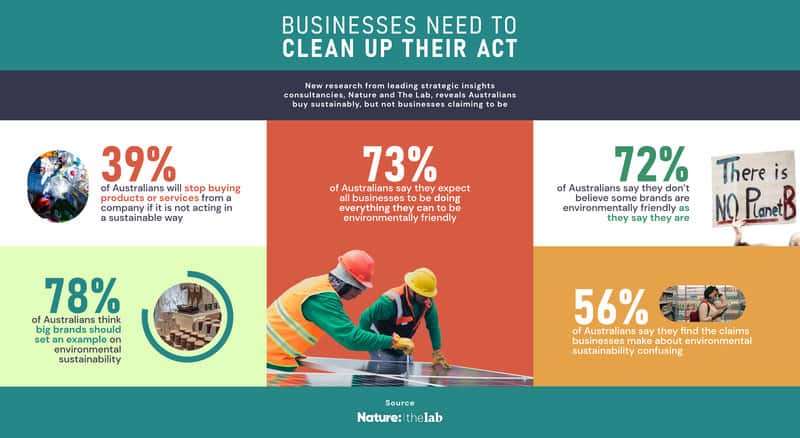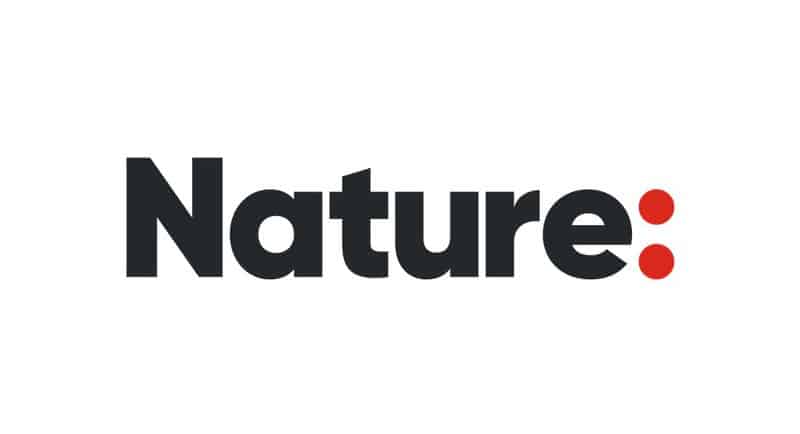A study by Nature and The Lab found that four out of every 10 Australians will stop buying products or services from a company if it is not acting in a sustainable way.
The survey of more than 2,000 people by the strategic insights consultancies also revealed that eight out of 10 Australians think big brands should set an example on environmental sustainability, with over 70% of people expecting all businesses to be doing everything they can to be environmentally friendly.
The research uncovered widespread confusion and scepticism among Australians about sustainability claims. Over 70% of people don’t believe some brands are as environmentally friendly as they say they are, and more than half find the claims businesses make about environmental sustainability confusing.
Key findings from the study include:
• 63% of people say they think very highly of brands that are environmentally friendly, up from 45% in 2019
• 47% of people under 30 say they will stop using a business if it is not acting sustainably (39% across all people)
• 78% of people think big brands should set an example on environmental sustainability, up from 58% in 2019
• 73% of people say they expect all businesses to be doing everything they can to be environmentally friendly, up from 52% in 2019
• 72% of people say they don’t believe some brands are environmentally friendly as they say they are, up from 51% in 2019
• 56% of people say they find the claims businesses make about environmental sustainability confusing, up from 34% in 2019
Tabitha Kelly, Nature consultant, said: “People are both increasingly demanding and confused. There is a clear onus on all businesses to be doing more for the environment, to be honest about what they are doing, and to communicate that to people in a clear and transparent way.
“One of the biggest changes over the past three years is in the categories in which consumers expect brands to be leading the way. Three years ago, sustainability was limited to fast-moving consumers goods and packaging, whereas now we see this expectation extend into services like electricity and gas. Now it is top of mind for many people and it is affecting how they behave and where they spend their money.
“People want businesses to do the right thing, creating a clear opportunity for all companies and organisations to step up,” she said.

Justin Connally, Nature partner and Melbourne managing director, said: “To navigate this changing environment, businesses need to know how to properly communicate about sustainability with consumers.
“Companies need to clearly link their sustainability message to their brand to make a positive impact with consumers. Brands that aren’t already known in the sustainability space can still have an impact by using their packaging to communicate their sustainability claims and integrate it into their existing branding.
“Consistent investment in sustainability messaging over a longer period of time pays dividends in the brand being perceived as a leader in sustainability. And it’s important to note that sustainability communications can be done in an upbeat way, but the message needs to be future-focused, believable and positive,” Connally said.
Paul Labagnara, The Lab Co-Founder, said: “What this research shows is that people are getting more impatient with brands to demonstrate their commitment to sustainability, and even the less tangible service brands are being called into action as people’s awareness of how all businesses can contribute to a more sustainable future increases.”
The Lab Melbourne Behavioural Science lead, Chris O’Keefe, added: “When a brand demonstrates clear action toward a more sustainable future, it helps alleviate the environmental ‘cost’ for people and increases its value, driving more people to choose it over another.
“This is becoming more imperative to maintain consumer spend against the backdrop of the increased cost of living. For the brands that are doing the right thing, we have identified the behavioural principles to harness and drive the biggest impact in this context.”
The research by Nature and The Lab was conducted in late June 2022 and covered 2,299 people across Australia. The survey sample was representative of the national population.
